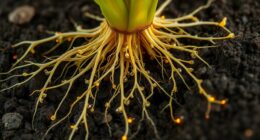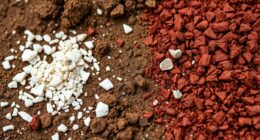Organic fertilizers come from natural sources like compost and manure, releasing nutrients slowly and promoting soil health and microbial activity. In contrast, inorganic fertilizers are manufactured from synthetic chemicals, providing quick nutrient uptake but offering less benefit to soil structure. While organic options support long-term fertility and environmental sustainability, inorganic solutions deliver immediate growth boosts. If you want to understand how these differences can help optimize your garden, there’s more to explore below.
Key Takeaways
- Organic fertilizers come from natural sources and decompose slowly, while inorganic fertilizers are synthetically manufactured for quick nutrient release.
- Organic options improve soil structure and microbial health; inorganic fertilizers mainly supply nutrients without enhancing soil quality.
- Organic fertilizers support long-term soil fertility and ecosystem health, whereas inorganic fertilizers provide immediate plant nutrient availability.
- Overuse of inorganic fertilizers can cause soil degradation and nutrient runoff; organic fertilizers are environmentally friendly and sustainable.
- Combining both types can optimize plant growth, using organic for soil health and inorganic for targeted, rapid nutrient needs.

Have you ever wondered how organic and inorganic fertilizers differ in their impact on your garden? Understanding these differences can help you make better choices to promote healthy plant growth. Organic fertilizers are derived from natural sources like compost, manure, bone meal, and fish emulsion. They work slowly, releasing nutrients gradually as they break down in the soil. This slow release helps improve soil structure over time, increasing its ability to retain water and nutrients. Because they come from natural materials, organic fertilizers tend to promote a thriving soil ecosystem, encouraging beneficial microbes and earthworms. These microbes help decompose organic matter, making nutrients more accessible to your plants. Organic fertilizers are generally considered environmentally friendly, as they don’t contain synthetic chemicals that can leach into water supplies or harm wildlife. Using organic fertilizers can also support soil health by enhancing microbial diversity and activity.
In contrast, inorganic fertilizers are manufactured from synthetic chemicals or mined minerals. They are formulated to deliver specific nutrients in precise amounts, often in highly soluble forms. This means plants can absorb them quickly, providing an immediate boost for growth or flowering. Because they act fast, inorganic fertilizers are especially useful when your plants show signs of nutrient deficiency or during critical growth stages. However, their rapid action can also lead to over-fertilization if not carefully managed, which might cause nutrient runoff, water pollution, or damage to plant roots. Inorganic fertilizers don’t improve soil health directly; instead, they mainly supply nutrients that may not contribute to the long-term fertility of your garden. Over time, relying heavily on inorganic options may lead to soil degradation, as they don’t support the beneficial microbes essential for a resilient soil ecosystem.
Choosing between organic and inorganic fertilizers depends on your gardening goals and practices. Organic options tend to be better for sustainable gardening, fostering a healthier soil environment and reducing environmental impact. They require patience, as nutrients are released slowly, but they build a more resilient soil structure over time. Inorganic fertilizers provide quick results, making them attractive for specific needs or when you need to address a nutrient deficiency rapidly. However, they require careful application to avoid potential negative effects like salt buildup or nutrient imbalances. Ultimately, blending both types might serve your garden best, using organic fertilizers to build soil health and inorganic ones for targeted, immediate nutrient needs. By understanding these differences, you can tailor your fertilization approach to support a vibrant, productive garden while maintaining ecological balance.
Frequently Asked Questions
How Do Organic and Inorganic Fertilizers Affect Soil Health Long-Term?
You might wonder how fertilizers impact your soil over time. Organic fertilizers enrich the soil with organic matter, encouraging healthy microbial activity and improving structure long-term. In contrast, inorganic fertilizers provide quick nutrients but can degrade soil health if used excessively, potentially leading to compaction and nutrient imbalances. Using organic options helps maintain soil vitality, ensuring your garden stays fertile and productive for years to come.
Are Inorganic Fertilizers More Cost-Effective Than Organic Options?
They say “you get what you pay for,” and inorganic fertilizers often seem more cost-effective initially because they deliver quick results and are cheaper upfront. However, you should consider long-term costs, like soil degradation and environmental impact, which can lead to higher expenses over time. Organic options might cost more now, but they promote healthier soil, reducing future costs and supporting sustainable growth.
Can Organic Fertilizers Meet the Nutrient Demands of All Crops?
You might wonder if organic fertilizers can fully satisfy your crops’ nutrient needs. While they provide essential nutrients and improve soil health over time, they often release nutrients more slowly and may not meet the rapid demands of all crops, especially high-yield ones. To guarantee your crops thrive, consider combining organic fertilizers with other practices or supplements, tailoring your approach to your specific crop requirements and growth stages.
What Environmental Impacts Are Associated With Inorganic Fertilizer Use?
Imagine inorganic fertilizers as quick-drying paint, providing instant color but risking long-term damage. When you use them, you might see immediate crop boosts, but they can lead to environmental issues like water pollution from runoff, soil degradation, and greenhouse gas emissions. These impacts threaten ecosystems and water quality, making inorganic fertilizers a double-edged sword. You should weigh their benefits against potential harm to preserve environmental health.
How Do Application Methods Differ Between Organic and Inorganic Fertilizers?
When applying fertilizers, you’ll notice that organic options are often spread manually or incorporated into the soil to promote gradual nutrient release. In contrast, inorganic fertilizers are typically applied using precision equipment, like spreaders or injectors, allowing for quick nutrient delivery. You might also see inorganic fertilizers used in liquid form for foliar feeding, whereas organic fertilizers usually require more preparation and time before nutrients become available to plants.
Conclusion
Just like choosing between a classic novel and a modern bestseller, picking organic or inorganic fertilizers depends on your goals. Organic fertilizers nurture your soil naturally, much like nurturing a garden with patience and care, while inorganic options offer quick results, like a swift plot twist. Understanding these differences helps you make smarter choices for your plants’ health and your garden’s future, ensuring your green space thrives just like a well-tended legend coming to life.









